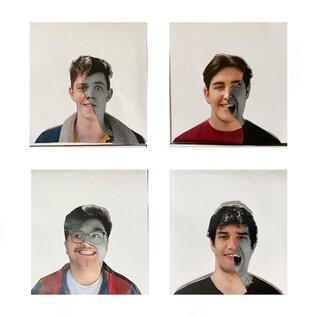Corey Spence

It is a classic narrative: four laddish teenagers – Ezra (Renata Mahuika), Cameron (Caleb Pedro), Bradley (Isacc Andrews), and Jamie (Jackson Burling) – drink to excess at a party, one suggests they’re sober enough to drive, and eventually calamity ensues… It’s all downhill, quite literally, from there.
The set is mostly barebones – a few twigs and leaves help us suspend our disbelief enough to centre the play in the bush off the side of some rural road. This does leave the performers plenty of space to play with, and while much of the action is sedentary, I think this shows immense control from the cast. It would be easy, a cop-out even, for the cast to frantically dart across the stage in their moments of angst or explosive anger, but they don’t. Mahuika’s monologues that explore Ezra’s struggle to express emotion and unpack his feelings have the time to shine here, as does Burling’s phenomenal physicality of Jamie’s concussion. It also serves to remind us that they are, indeed, stuck in a limbo.
A fixture on the right side is a cleverly used car bumper, one which incorporates two turtles that cascade light across the stage. This is an awesome use of lighting (credit to Charleigh Griffiths for their work on lighting and sound) but it’s only ever used twice. For such a mainstay, and for a literal and figurative vehicle the play’s narrative hinges on, it begs to be included – to be invited to the party, just like Bradley was.
The characters spend much of the play in a mess of injuries and stress stuck in some sort of ravine, unable to seek help and get out of their situation. Armed with nothing else but vague survival knowledge sourced from YouTube about pissing on themselves for warmth, rather tame games of two truths and a lie, and their thoughts, what follows is a series of conversations where the boys come to terms with their lives, behaviour, and pressure that’s both self-imposed on thrust upon them by others – centring around sex, cheating, consent, and platonic love and support.
Some scenes are incredibly humorous, which does help lighten the mood and give the show space to approve its heavier topics. There’s a bit about horror films that divulges into the cast barking like dogs at the audience, where Mahuika and Pedro are at their comedic best, though occasionally, the ‘injuries’ their characters have fade from their physicality. From these burst scenes that are sharp and emotional, which does bring a depth the first half of the show is sorely lacking. A highly provocative sequence of ‘farewell videos’ comes to mind, as the stranded boys finally discover they too can express some semblance of feeling without being seen as weak. In these moments, Burling is incredibly compelling – he never once drops character and the way he holds focus whenever he speaks or reacts is a feat of acting excellence. Andrews, too, helps the cast navigate these emotional pits, as his character is often the catalyst for the harder conversations.
This testosterone- and alcohol-fueled first half often feels messy and chaotic, kind of like a night out partying, but occasionally to a disservice of the show’s themes. I get that we swear when we’re drunk or stressed, but it does feel hyperbolic and excessive. “Fuck” is a great punctuator… just not when it pops up multiple times in nearly every sentence. And in many ways, Boys, Wake Up! only dips into the shallow waters of our binge drinking culture and teenage masculinity. We ‘see’ the problems these boys face but many don’t come to a satisfying conclusion. A scene that tiptoes around drinking and consent is certainly confronting, but aside from the characters being disappointed or angry with each other, little is done or reflected on.
As we reach the heartfelt denouement of the play, I become captivated by it. There’s a beautiful, harrowing rendition of the group’s favourite song as the narrative slowly skips to the consequences of the crash. We watch as Burling delivers the closing monologue, elegiac and morose, and I wish this tenderness interlaced throughout the show more, since it’s only now I see how the character’s have grown and changed. Though, I do begin to wonder if that’s the point. Is the narrative, the show itself, a wider metaphor for that process of growing up, discovering mistakes, learning from them, and making change?
Maybe? But I also wonder if I, as an audience member, am doing too much work unpacking it. The show itself doesn’t really offer anything new to its topics or interrogate the binge drinking culture, particularly of our young boys – and it feels like it wants to do both of those things. Does it refresh this narrative and feel centred in 2022? Certainly. Do I feel like I came away from it learning about or thinking differently about the what, how, and why of our alcoholic fixation? No. Does that bother me? Kind of. Especially for an adult audience, in Wellington, in 2022, who already understand or acknowledge that these issues are so deeply sunk in the beer keg of our country.
When Boys, Wake Up! focuses on the heartfelt moments, it becomes a tender analysis of speaking up, of acknowledging wrongs and owning mistakes, of reflection. And in these moments, Boys, Wake Up! is evocative. While its criticism towards binge drinking, toxic masculinity, male entitlement, and silly ‘rites of passage’ for teenage boys feels surface at times, what lies beneath is a clever metaphor for learning from, and owning, the mistakes we make. A bit more polish and some digging into the specific critiques the show wants to make about the multitude of ideas it dances with would help it feel more satisfying and engaging from start to finish.
Boys, Wake Up! is now showing at BATS Theatre until Saturday 8 April.





